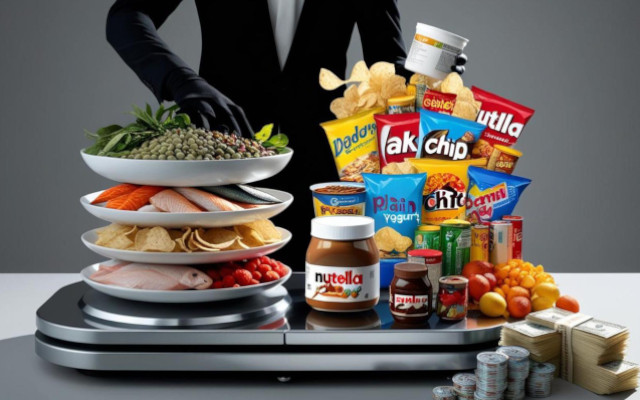Since its proposal by scientists in 2014, the Nutri-Score – a front-of-pack nutrition label adopted by France in 2017 and later by Belgium, Spain, Germany, Luxembourg, the Netherlands, and Switzerland – has faced significant criticism.
Despite strong support from the scientific community, public health organizations, consumer associations, and NGOs, detractors, backed by some powerful agri-food lobbies, have spread viral deception to discredit it.
EREN (Equipe de Recherche en Epidémiologie Nutritionnelle), the research group at the Sorbonne University in Paris which created Nutri-Score, once again debunks with scientific precision the misleading narratives. (1)
Common misconceptions about the Nutri-Score
1. Is the Nutri-Score oversimplified?
Critics often label the Nutri-Score as ‘simplistic’ or ‘reductive’. However, the NS label is designed to be simple and intuitive, summarizing the overall nutritional quality of foods in an easily understandable format:
• behind its simplicity lies a robust scientific foundation, validated by over 110 peer-reviewed studies
• the Nutri-Score’s algorithm incorporates key nutrients of public health concern, balancing those to promote (e.g., fiber, protein) and those to limit (e.g., sugar, salt, saturated fats). (2)
2. Does the Nutri-Score stigmatize certain foods?
Detractors claim the Nutri-Score is stigmatizing or anxiety-inducing. In reality, the label objectively reflects the nutritional composition of foods, aligning with public health recommendations.
Foods high in sugar, salt, or saturated fats (e.g., processed meats, cheeses) are marked with orange or red labels, signaling they should be consumed in moderation.
Studies show that 90% of consumers appreciate the Nutri-Score and support its mandatory implementation, with no evidence of it causing anxiety or infantilization.
3. Does the Nutri-Score infringe on individual freedoms?
Critics argue that the Nutri-Score undermines personal choice. However, food choices are heavily influenced by marketing, pricing, and product placement, often promoting unhealthy options.
By providing clear nutritional information, the Nutri-Score empowers consumers to make informed decisions, enhancing rather than restricting their freedom.
4. Does the Nutri-Score penalize traditional foods?
The Nutri-Score evaluates foods based on their nutritional content, regardless of tradition or origin. While some traditional products like cheeses and cured meats may score lower, due to high salt and fat content, others (62% of traditional foods in France) score well (A, B, or C).
The label complements origin certifications (e.g., PDO/PGI), encouraging consumers to ‘eat less but better’. Learn more about traditional foods and the Nutri-Score:
• Nutri-Score and quality labels (3)
• UFC Que Choisir study on French traditional foods. (4)
5. Does the Nutri-Score ignore ultra-processing?
The Nutri-Score focuses solely on nutritional quality, not ultra-processing or additives. While these factors are important, they are not currently integrated into any global nutrition label.
Complementary labeling could address these dimensions separately, as Nutri-Score creator Professor Serge Hercberg has been proposing since 2021, to ensure comprehensive information.
6. Is the 100g basis misleading?
The Nutri-Score uses a 100g/100ml basis to ensure consistent comparisons across products. Portion sizes, on the opposite, vary widely and can be manipulated by manufacturers in markets like the EU’s one where no criteria have been defined so far. A standardized measure is therefore essential for accuracy. (5)
7. Does the Nutri-Score oppose the Mediterranean diet?
Italian lobbies claim the Nutri-Score penalizes Mediterranean staples like cheese and cured meats. However, the Mediterranean diet emphasizes fruits, vegetables, whole grains, legumes, olive oil, with limited consumption of processed meats and cheeses.
The Nutri-Score promotes healthier choices within the Mediterranean diet, which the populations of Mediterranean countries have indeed lost sight of. For more on the Mediterranean diet and the Nutri-Score, visit:
• Nutri-Score and Italian politics (6)
• Anti Nutri-Score lobbies over the years. (7)
Conclusion: a tool for public health
The Nutri-Score is a scientifically backed tool designed to enhance consumer choices and improve public health. Despite some limitations, its benefits far outweigh the criticisms, which are often fueled by misinformation campaigns. By debunking misconceptions and promoting transparency, the Nutri-Score empowers consumers to make informed, healthier choices, supporting broader efforts in nutrition education and public policy.
The European Court of Auditors (2024) has already censured the European Commission for repeated delays in defining nutritional profiles and adopting a harmonized Front-of-Pack Nutrition Labelling (FOPNL) system. With several EU countries already implementing front-of-pack labels, the Nutri-Score stands as the most effective, science-based option. Any further delay will only reinforce the perception of poor governance in Brussels. Instead of debating its validity, discussions should now shift to its implementation, rather than opposing it without scientific basis.
#PeopleoverProfit, #Égalité
Dario Dongo
References
1. Réponses scientifiques aux critiques des détracteurs du Nutri-Score. Nutri-Score Blog. (2025). https://tinyurl.com/2rdfhw6x
2. Le Nutri-Score et les autres dimensions santé des aliments: Informer au mieux les consommateurs. Nutri-Score Blog. (2021). https://tinyurl.com/3ffyde34
3. Nutri-Score: Même avec un signe de qualité ou d’origine, un produit gras, sucré ou salé reste un produit gras, sucré ou salé. Nutri-Score Blog. (2021). https://tinyurl.com/4eab2nnv
4. Enquête de l’UFC Que Choisir sur le Nutri-Score des aliments traditionnels. Nutri-Score Blog. (2022). https://tinyurl.com/ydym9eya
5. Serge Hercberg, Pilar Galan, Emmanuelle Kesse-Guyot, Mathilde Touvier, Chantal Julia (2021). Pourquoi Nutri-Score est calculé sur la base de 100g et non par portion (comme demandé par les industriels)? Nutri-Score Blog https://tinyurl.com/2a3k2npu
6. Serge Hercberg, Pilar Galan, Manon Egnell, Chantal Julia, Mathilde Touvier (2019). Nutri-Score Blog https://tinyurl.com/yckf8y32
7. Une enquête du journal Le Monde sur le lobbying anti Nutri-Score.Nutri-Score Blog. (2022). https://tinyurl.com/4s3snaah
Dario Dongo, lawyer and journalist, PhD in international food law, founder of WIISE (FARE - GIFT - Food Times) and Égalité.








